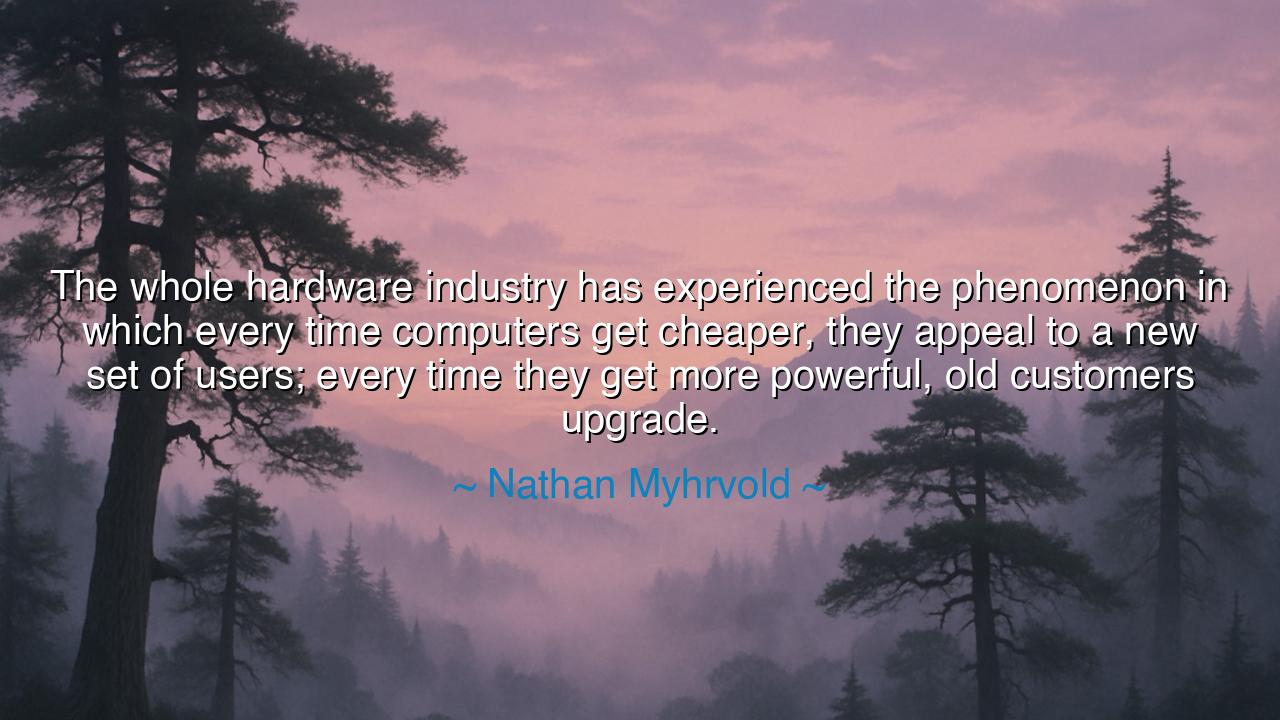
The whole hardware industry has experienced the phenomenon in
The whole hardware industry has experienced the phenomenon in which every time computers get cheaper, they appeal to a new set of users; every time they get more powerful, old customers upgrade.






“The whole hardware industry has experienced the phenomenon in which every time computers get cheaper, they appeal to a new set of users; every time they get more powerful, old customers upgrade.” — Nathan Myhrvold
Hear these words of Nathan Myhrvold, a visionary of the digital dawn, and perceive in them not merely the story of machines, but the eternal law of progress. He speaks of computers, but his meaning reaches far beyond circuits and silicon — it touches the rhythm by which all creation grows. The world, he reminds us, moves in cycles of renewal and expansion. When power becomes more accessible, it awakens the interest of the many; when it grows in strength, it rekindles the ambition of those who already possess it. Thus, the dance of invention continues, each step feeding the next — the new joining the circle, the old ascending to greater heights.
In this cycle lies a reflection of life itself. When something becomes cheaper, it opens its gates to new hands, new hearts, new dreamers who once stood outside the walls of privilege. The computer, once a tool of scientists and scholars, has descended from the halls of research into the humble homes of children and artisans. What was once the domain of the few has become the instrument of the many. And when such accessibility grows, so too does the potential of humanity. Myhrvold’s words speak of the democratization of power, the unfolding of knowledge from towers of exclusivity into the hands of the world.
But there is also the other side — the call to ascend. For as machines become more powerful, those who have walked the path before must rise to meet new challenges. The old customers upgrade, not out of greed alone, but from the eternal hunger to expand their capabilities, to harness the new tools of creation. This is the dual nature of progress: it feeds both the beginner’s curiosity and the master’s ambition. And in this endless renewal, civilization itself evolves.
Consider the tale of Steve Wozniak and Steve Jobs, who in the age of giants dared to dream of bringing the computer into every home. In their time, machines were vast, expensive, and sacred — untouchable by the common man. But as the cost fell, the world shifted. What was once a luxury for governments became a playground for garage inventors. The hardware industry, like the forge of a thousand suns, sparked the imagination of millions. And so began the personal computing revolution — not born in laboratories of wealth, but in humble places where dreams outpaced resources. Myhrvold’s words stand as witness to this truth: progress grows strongest when it becomes shared.
Yet, the ancient wisdom reminds us — power without purpose is emptiness. As technology expands, we must ask: what shall we do with this abundance? For every time the gates open wider, humanity must rise to meet its new responsibility. The affordability of tools brings opportunity, but also the test of character. Will we use our newfound power to create, to educate, to uplift? Or will we, intoxicated by novelty, forget the essence of what we build? Myhrvold’s observation, though practical, whispers a moral truth beneath: that progress is sacred only when guided by wisdom.
In the pattern he describes — cheaper, then stronger; accessible, then advanced — we see not only the cycle of commerce, but the cycle of human growth. Every generation inherits what was once impossible, and in using it, prepares the way for the next transformation. This is the law of innovation, the rhythm of civilization. It mirrors the way knowledge passes through the ages — from scholar to student, from creator to apprentice — each learning, improving, and giving back.
Therefore, O seeker of progress, let this be your lesson: embrace change with both gratitude and vigilance. When new tools come into your hands, use them not idly, but with purpose. When old tools evolve, do not resist their power, but grow alongside them. Be both the new user and the upgrader, both the student and the master. For the world will continue to evolve, and so must you. Let your curiosity remain humble and your ambition noble. And remember — every step forward in the hardware of machines must be matched by a step upward in the software of the soul.
For the wisdom of Nathan Myhrvold is this: that progress is not a straight road, but a spiral — each turn lifting both the old and the new toward a higher plane of understanding. The tools will change, the power will grow, but the heart of the creator remains the same — ever seeking, ever rising, ever renewing the world anew.






AAdministratorAdministrator
Welcome, honored guests. Please leave a comment, we will respond soon